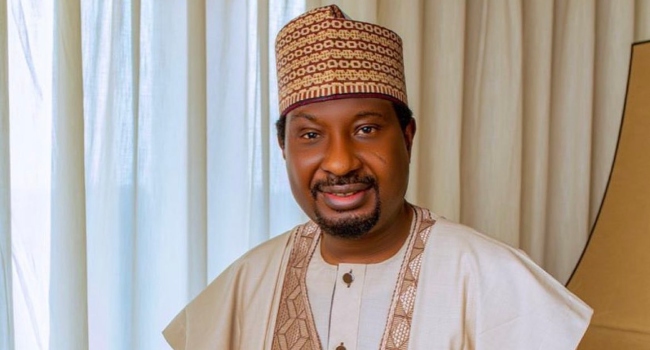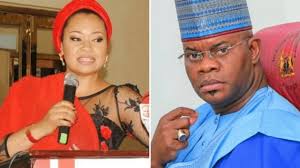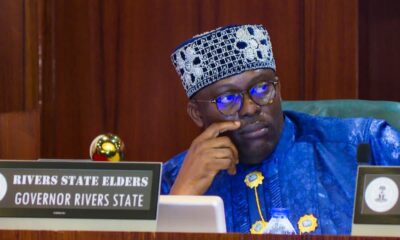Politics
On State Police And Nigeria’s Polity
There are esoteric reasons in the current prolonged agitations for state police, or otherwise. That is, beyond the known reasons given by different individuals and groups. A critical scrutiny of all the views expressed so far reveals unanimity in several areas regarding the importance of state police.
For one, the agitations, no matter the stand, have revealed that more Nigerians have become interested in governance. What this means is that more people are becoming more knowledgeable in the affairs of government to the point of making their own contributions. Whether such contribution is inconsequential is talk for another day.
But the truth is Nigerians have become more familiar with the intricacies of democracy after years of military dictatorship. The question thus is how prepared are the privileged few in governance to making the same adjustments as the majority of Nigerians?
Another area of agreement among all contributors to the state police saga is that the Federal Police has failed irrevocably in its responsibility to protect the lives and properties of Nigerians. Hence, the most pressing need for a way forward.
It is based on this agreement that the Governor’s Forum, which has become a very important arm of government, deemed it necessary to come up with the idea of a state police that would be under the direct control of governors, who are the chief security officers of the 36 federating states.
This agreement, ironically, turned out to be the point of disagreement, first among the governors, and later the rest of the schooled Nigerian public.
While governors in the southern part of the country are for the establishment of state police, because they believe it is the solution to the worsening security situation in the country, their colleagues from the north think differently.
To them, Nigeria is not ripe for a state police. They thus align with the Presidency, which has minced no words in its stand that the country still has a long way to go before it can effectively contain regional policing. Both of them have allies in former Inspectors-General of Police (IGPs), who in a recent meeting with the Presidency said state police would amount to “an invitation for anarchy”.
In the words of a human rights activist, Shehu Sani, the reason behind the opposition of the northern state governors to state police are numerous. Among them are the fear of a repeat of the brutality it used against the opposition during the colonial era in the north, and the possibility of some governors using it to enhance their secessionist tendencies.
“During the colonial time, the local police were directly under the emirate system referred to as Native Authority. At that time, they were brutally used against members of the opposition”, Sani said.
He continued that “They arrested people like late Hijiya Gambo Sawaba, then woman leader of late Aminu Kano’s party, Northern Element Progressive Union (NEPU) for no other reason than being a member of the opposition…
“If you look at what the Sharia police (Hisbah) are doing today at Kano and Zamfara, it is similar to what the Native Police did in the First Republic. Even though the Hisbah set up by the state governments claim to be enforcing Sharia law, they are used against people who criticize governors and their policies. Governors also use Hisbah to rig local government elections.”
The second key reason, according to Sani is that the North’s opposition “has to do with the event that led to the build up to the civil war. There is very strong fear that if the state police are allowed, some states’ secessionist ambition could arm the state police through the back door with weapons, which could lead to the breakup of the country.”
One of the former IGPs, Mike Okiro, made the same anti-decentralisation argument during a recent meeting of the South-South Peoples’ Assembly held in Delta State. According to him, “State police cannot help the country. We have tried it before in this country under the regional governments and it did not work.
“It is clear that state governors will misuse it if we go back to state police. They will use it against their political opponents, and I think in a democracy, people should be given the freedom to exercise their rights.” This stand has obviously been a common feature of the anti-state police perspective.
As elder Statesman and leader of Ijaw nation, Chief Edwin Clark puts it, “I don’t believe in state police, even though it is an essential ingredient of democracy. Nigeria as of today is not developed democratically to the extent of having a state police.
“The way the state governors behave has not made it necessary to have a state police. Some of the governors behave like dictators and there is this fear that they will use the state police for their political interests such as political thuggery,
“The governors are the chief security officers of their respective states and with state police, they will acquire the powers of life and death, where they will use it at their beck and call to intimidate and cajole their political enemies.
“At the right time, when the democratic practice is matured, state police can be introduced, but certainly not now. I will rather advocate the reformation of the Nigeria Police,” he explained.
Clark further argued that it was curious that some states that are yet to pay the minimum wage of #18,000.00 are among the advocates of the creation of the state police. He reasoned that if they are unable to pay the minimum wage of #18, 000.00 in a situation where the least paid police man earns about #30,000.00, where would they get the money to fund the police?
The implication of this leitmotif stand of the anti-state police is that the Federal Government is more mature and hence more capable to use the police for the good of all than the state governors.
However, former Lagos State Police Commissioner, Mr. Young Arebamen (rtd), disagrees with this perspective. He says the security challenges have grown beyond the competence of a centralised police and advised the Fedral Government not to politicise the issue.
“I can’t understand why some people are afraid of state police, if we have done something for 50 years and we still have problem of insecurity in the system, it is high time we began to think differently… if you eat eba that contained poison in the 60s, will you because of that stop taking eba? The answer is no. all you need to do is to avoid poison”, he said.
How to do this in the present state police saga, he explained, is to institute a control mechanism: “control measure should be spelt out in the constitution to avoid abuse of state police by state governors. We should learn lessons from history and proffer solutions for today and tomorrow”
In buttressing his position further, Arebamen noted that even in the present status quo, the state governments “are mostly responsible for the material and financial needs of the Federal Police”.
He said the governors as chief security officers of the states provide the police with patrol vehicles, maintain and fuel the vehicles, in addition to providing bullet proof vests, arms and ammunition, telecommunication gadgets, and also pay special allowances to those serving in the anti-crime squads.
“We should take politics out of security problems and face the reality of the time”, he concluded.
Unfortunately, this is where Shehu Sani totally disagrees when he noted that “The (governors) have bastardised the local government system, pocketed the states legislature and consistently manipulated elections to their favour, and at the same time looting the state treasury.
“If they have proved incapable, dubious and dishonest in handling those institutions, is self destruction for anyone to think that they can perform magic with state police”.
Even he, however, agrees that state police is necessary, “but the advocates should (first) come out with measures that will make it impossible for state authorities to manipulate”.
One way to do this, he said, is not just “creating layers of security and multiplicity of state apparatus, but ensuring that social justice and economic opportunities are abound for all Nigerians”.
This, obviously, is an unequivocal challenge for government to not only come up with a dispassionate constitution at all levels of governance, but also ensure that such constitution is followed to the letter in terms of application.
Politics
Fubara Tasks Rivers Stakeholders On Political, Economic Emancipation …Commissions NAVAL Training Command Headquarters At Ebubu

Rivers State governor, Sir Siminalayi Fubara, has stated that the task of emancipating Rivers State and taking it to its desired height of development among the comity of Nigerian states depends on the concerted efforts of all stakeholders in the state.
Governor Fubara said this at Ubima, on Saturday, when he attended the burial ceremony of late Madam Cecelia Omehia, mother of Sir Celestine Omehia.
Addressing the leaders of the state who attended the burial ceremony in their numbers, the governor urged them to demonstrate their love for the state by living up to their patriotic responsibilities and make meaningful contributions that will move the state forward.
Governor Fubara reaffirmed his commitment to the service of the state and cautioned against politics of bitterness and animosity, stating that he will not govern the state as an underdog, nor compromise the interest of Rivers people, no matter the challenges facing his administration.
“Anybody who claims to love this State should not be party to anything, directly or indirectly, that will bring us backwards. We will continue to support every course that will advance the interest of our dear Rivers State.
“And I am happy to say, and I’ve said it over and again, it doesn’t matter the number of people that are standing with me, I will stand on the side of truth.
”I will not, I repeat, I will not govern our dear State on my knees. If that was the purpose, I will not do that. I will stand to govern our dear state and stand continually on the side of right”, he said.
The governor commiserated with the Omehia family over the transition of their beloved matriarch and urged them to take solace in the good legacies she left behind.
Sir Celestine Omehia, the chief mourner, in his response thanked the Rivers State governor and his entourage for honoring the memory of his beloved mother, whom he described as a role model, teacher and great disciplinarian.
Earlier on Saturday, Governor Fubara visited the scene of the Friday night inferno occasioned by a tanker explosion that occurred at the Indorama axis of East West Road, causing untold disaster with over 60 vehicles razed and about four lives lost.
Governor Fubara who was accompanied by the Commissioner of Police in Rivers State, Olatunji Disu, and the state Commissioner for Energy and Natural Resources, Mr Uchechukwu Nwafor, during the visit, expressed deep concern over the unfortunate incident and condoled with the families of the victims, assuring that the state government will provide needed assistance to cushion the effects of the tragedy.
“We are here to see for ourselves and get a first hand information of what happened yesterday night.
“I was told that it was caused by a tanker that was conveying premium motor spirit. In fact, I got the information through the MD of Indorama, and I immediately alerted the security agencies to make sure they take control of the security situation in the area.
Governor Fubara, on Friday, commissioned the new Naval Training Command Headquarters at Ebubu, Eleme Local Government Area of Rivers State.
Speaking at the event, Governor Fubara said he was delighted with the transformation recorded in the abandoned facility after it was ceded by the Rivers State Government to the Nigerian Navy on request in 2023.
He pointed out that the relocation of the Naval Training Command headquarters to Rivers State underscores the proficiency of the Nigerian Navy in managing the maritime sector, especially in safeguarding the waterways and fighting against economic sabotage such as crude oil theft and its associated menace.
Governor Fubara commended the Navy for investing in the training of its personnel to evolve a highly skilled workforce to secure the Nigerian waterways, stating that the new development is a manifestation of President Bola Tinibu’s commitment to building a strong security architecture for Nigeria.
The Governor who assured the support of his administration to the Navy and other security outfits, announced a donation of N350m to the Navy, and urged synergy between the Navy and the host communities in terms of development support and security of lives and property.
“As you go on to put this training command into full service, my charge to you is to ensure that this sprawling facility is effectively maintained and utilized to expand your operations and activities for national security development.
“I further implore you to provide effective security and development support to the host communities, and live in peace and harmony with the civilian population in the local government area,” the Governor added.
In his remark, the Chief of Naval Staff, Vice Admiral, Emmanuel Ogalla, expressed gratitude to the Governor for the continuous support and partnership of the Rivers State Government with the Navy.
Taneh Beemene
Politics
Constitution Amendment: Senator Barau Urges Stakeholders’ Collaboration

Deputy President of the Senate and Chairman of the Senate Committee on the Review of the Constitution, Senator Barau Jibrin, has called for robust collaboration among all stakeholders to drive the ongoing constitution amendment process to a successful conclusion.
Senator Barau stated this on Saturday at the joint retreat of the secretariat and consultants to the Senate and House of Representatives committees on the review of the Constitution of the Federal Republic of Nigeria 1999, in Abuja.
He commended the synergy between the constitution review secretariat and consultants to the Senate and House of Representatives committees, saying this will create harmony in the workings of both committees.
Senator Barau assured that the National Assembly will carry out the review of the constitution by a thorough aggregation of the yearnings of Nigerians from all walks of life through public hearings and collection of memoranda from various interests throughout the country, as well as embarking on a progressive engagement with state governments and legislatures and the federal government to achieve consensus on all issues.
“We must work together. Our country is facing a lot of challenges and this is the right time to fashion out a constitution that will go in line with the wishes and aspirations of the people of this country.
“The world is dynamic and this compels all serious countries to go with modernity and fashion their laws in accordance with contemporary happenings within their peculiarities.
“We have started on a progressive note of collaboration and let us add momentum to this very important collaboration within our ranks in order to achieve a result that will help in driving the process of making prospective peace, justice and fair play in the way we run our affairs as a nation,” he said.
Politics
Makinde Hails Electorate, OYSIEC Over LG Poll Conduct

Oyo State governor, Seyi Makinde, has applauded the residents of the state for turning out to vote in the ongoing local government election across the state.
The governor also rated the conduct of the election high, stating it compared favourably with elections conducted by the Independent National Electoral Commission (INEC).
The governor stated this on Saturday after casting his vote at Unit 1, Ward 011, Abayomi Open Space, Iwo Road, Ibadan North East LGA of Oyo State.
Addressing journalists after exercising his civic responsibility, Gov Makinde said, “For us in Oyo State, it is almost like a given that democracy at the grassroots is what we practise. This is almost our fifth year in office and we are holding local government election for the second time.
“Before we came in, it had always been caretaker administration at the grassroots without the people having a say in who should govern them.
“You can see around also that the people are going about, performing the exercise peacefully and the traffic restriction is being obeyed by the people. So, I will commend our people for coming out to take seriously democracy at that level.”
The governor, who noted that security report about the election had been excellent, also charged those who observed any untoward development to report same to the security agencies.
-

 Nation2 days ago
Nation2 days agoYahaya Bello: Senator Hails EFCC’s Probe Of N80.2bn Fraud
-

 Niger Delta2 days ago
Niger Delta2 days agoMDCN Clears Asaba Specialist Hospital As Novena University Teaching Hospital
-

 Politics2 days ago
Politics2 days agoFubara Tasks Rivers Stakeholders On Political, Economic Emancipation …Commissions NAVAL Training Command Headquarters At Ebubu
-

 Foreign2 days ago
Foreign2 days agoMunitions Explosion At Cambodian Army Base Kills 20 soldiers
-

 Oil & Energy2 days ago
Oil & Energy2 days agoNigeria Loses Over 300,000 Barrels Of Crude Oil Daily To Theft – Abbas
-

 News2 days ago
News2 days agoFubara Tasks GPDA On Prosperous, Liveable City
-

 Environment2 days ago
Environment2 days agoWED:Activists Task Govt On Plastic Pollution, Synophom Ban
-
Business2 days ago
NCDMB, SON Maintain Lead In Business Efficiency Ranking

